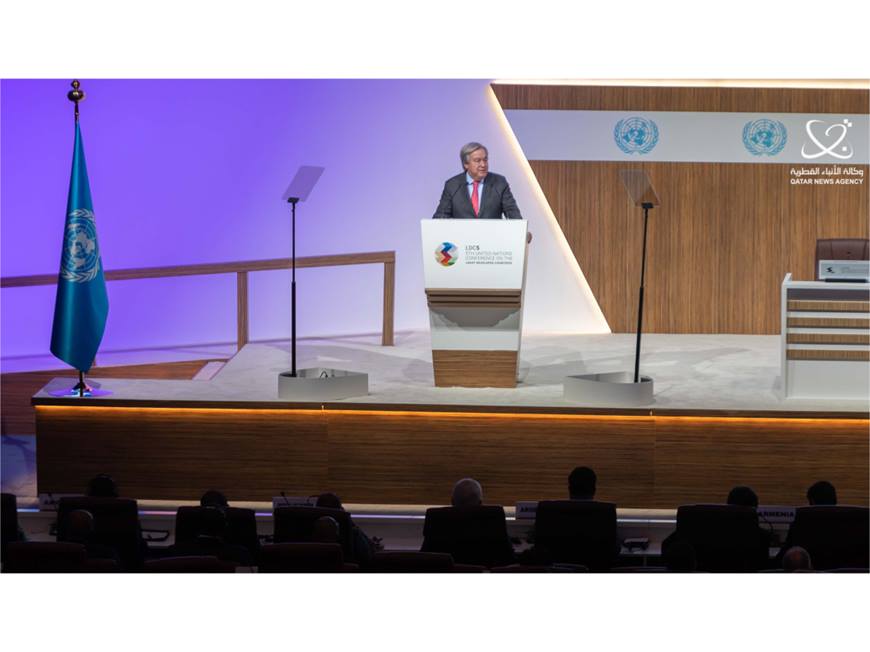ID :
654560
Sun, 03/05/2023 - 13:30
Auther :
Shortlink :
https://www.oananews.org//node/654560
The shortlink copeid
UN Secretary-General Stresses Need To Transform Doha Program Of Action Into Tangible Results

Doha, March 05 (QNA) - HE Secretary-General of the United Nations Antonio Guterres underlined the need to transform Doha Program of Action into tangible results, and to achieve this goal as soon as possible, especially since the world is exposed to unexpected changes. Addressing the 5th UN Conference on the Least Developed Countries (LDC5) which kicked off in Doha Sunday, HE the UN Secretary-General said that Doha Program of Action (2022-2023) is a practical guide to many issues, because it contains tangible objectives and outputs, such as the facility to support the removal from the least developed countries (LDC) list in a sustainable manner, the investment support center, and a virtual university that has an influential role in achieving sustainable development goals in the least developed countries. He called on the United Nations development partners to support the implementation of this program's outputs and objectives. Guterres noted that LDC5 was scheduled to be held in January 2022, but its sudden cancellation due to COVID-19 variant Omicron reminded the world that it is exposed to unexpected changes; citing the outbreak of the war in Ukraine and its devastating effects on the Ukrainian people, and great difficulties facing the least developed countries due to the huge increase in food and energy prices, as well as the global tensions and divisions that are deepening and increasing. He added that the deeply biased global financial system has clearly wronged the least developed countries as they are trapped in a wave of crises and uncertainty, as well as climate chaos and historical global injustice. These countries are unable to keep pace with the rapid technological changes, and their systems have reached the point of annihilation in health care, education, social protection, infrastructure and job creation. Unemployment is rising, especially among young people, and women are marginalized. The UN chief said the least developed countries face interest rates that are 8 times higher than those offered to developed countries, and this matter is only getting worse. In addition, 25% of developing economies spend more than 20% - not on building schools, nor on feeding their people or expanding opportunities for young men and women - rather to bear the costs of debt. He noted that some of these debts increased by more than 35% in the proportions of those costs. He underlined that the least developed countries need a revolution in the support provided for three main areas. First, the immediate assistance to save the sustainable development goals, because these countries consider these goals as reasons to survive in themselves, such as poverty eradication, health goals, food, clean water and sanitation; as well as an incentive package for sustainable development goals for which the world must stand together and provide at least $500 billion annually for developing countries. The US Secretary-General added that the time has come for the developed countries to fulfill their obligations towards the least developed countries by providing 0.15 to 0.20 percent of their GDP in the form of development aid, and that the United Nations will not accept excuses. He pointed to the need to strengthen international efforts to avoid non-payment of taxes, money laundering, and illegal financial flows that drain local resources, noting that while no country or region is immune from these actions, low-income countries lose a lot of tax revenues on these funds, although they need financing and support to achieve structural transformation. They also need to invest in manufacturing and technological capabilities, infrastructure and transportation networks, and to give women a seat at the decision-making table, the business sector and civil life, as well as investing in education and training in order to produce a qualified workforce that strengthens their institutions. Guterres said that the second major area in which the least developed countries need support is the reform of the global financial system. International financial institutions must devise ways to provide financing when it is needed most. This includes expanding reserve financing and incorporating catastrophe and pandemic clauses into lending instruments and clauses. It is also time to accelerate the reallocation of Special Drawing Rights from richer countries to those that need help the most, and to create greater flows of private financing at an affordable cost to developing countries, especially the least developed ones. He noted the importance of finding new and innovative ways to measure the economies of countries that go beyond just calculating the gross domestic product. The third and final area, according to Guterres, is that the least developed countries must revolutionize climate action because they produce less than 4% of greenhouse gas emissions, and it is a disaster that 7 out of every 10 deaths due to greenhouse gases occur in these countries. He emphasized that the developed countries must strengthen their support for the least developed countries, help them adapt, increase their ability to withstand climate change and move more smoothly to renewable energy sources. Developed countries must also fulfill their promises to provide $100 billion for developing countries, and simplify access to financing to take the required climate measures, as well as facilitating access to the Compensation Fund for Loss and Damage, strengthening the financing of adaptation efforts to double, striving to achieve higher equality for this fund, and supporting the development of early warning systems in the next five years for all countries of the world. The US Secretary-General called for concluding a climate cooperation agreement, providing financial and technical support to ensure the transition of emerging economies to renewable energy sources, and maintaining the goal of keeping the planet's temperature increase below 1.5 degrees, stressing it is time to end the "empty promises" era and to give enough attention to the needs of the least developed countries, which must be at the heart of projects, priorities and investments. (QNA)





